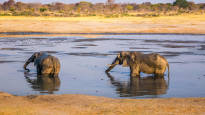Waterholes in Hwange National Park no longer provide enough to drink for thirsty animals.
At least a hundred elephants have died in Zimbabwe’s largest national park when water holes dried up, the International Fund for Animal Welfare said yesterday.
According to IFAW, the prolonged dry season has shrunk the once abundant waterholes to muddy puddles in Hwange National Park.
– At least a hundred elephants have already been reported dead due to lack of water, IFAW said in a statement.
Hwange National Park covers an area of over 14,600 square kilometers and is home to approximately 45,000 elephants.
– Despite the 104 drilled holes powered by solar power, according to the park’s staff, the water is not enough and does not cover the need caused by the extreme temperatures. The heat is drying up existing water bodies and forcing wildlife to walk long distances in search of food and water, the statement said.
The authorities in charge of Zimbabwe’s national parks and wildlife reported already in September that many animals have moved from the national park to neighboring Botswana in search of water and food.
– The expected animal deaths must be seen as a symptom of deep-rooted and complex challenges affecting the protection of natural resources in the region, which are exacerbated by climate change, IFAW expert Phillip Kuvawoga said.
Zimbabwe has the second largest elephant population in the world, around 100,000 animals.
Source: AFP
